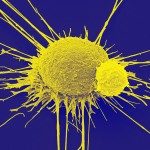Lien vers Pubmed [PMID] – 26407077
Lien DOI – 10.1371/journal.pone.0138420
PLoS One 2015 ; 10(9): e0138420
HIV replication follows a well-defined pattern during the acute phase of the infection in humans. After reaching a peak during the first few weeks after infection, viral replication resolves to a set-point thereafter. There are still uncertainties regarding the contribution of CD8(+) T cells in establishing this set-point. An alternative explanation, supported by in silico modeling, would imply that viral replication is limited by the number of available targets for infection, i.e. CD4(+)CCR5(+) T cells. Here, we used NOD.SCID.gc(-/-) mice bearing human CD4(+)CCR5(+) and CD8(+) T cells derived from CD34(+) progenitors to investigate the relative contribution of both in viral control after the peak. Using low dose of a CCR5-tropic HIV virus, we observed an increase in viral replication followed by “spontaneous” resolution of the peak, similar to humans. To rule out any possible role for CD8(+) T cells in viral control, we infected mice in which CD8(+) T cells had been removed by a depleting antibody. Globally, viral replication was not affected by the absence of CD8(+) T cells. Strikingly, resolution of the viral peak was equally observed in mice with or without CD8(+) T cells, showing that CD8(+) T cells were not involved in viral control in the early phase of the infection. In contrast, a marked and specific loss of CCR5-expressing CD4(+) T cells was observed in the spleen and in the bone marrow, but not in the blood, of infected animals. Our results strongly suggest that viral replication during the acute phase of the infection in humanized mice is mainly constrained by the number of available targets in lymphoid tissues rather than by CD8(+) T cells.


